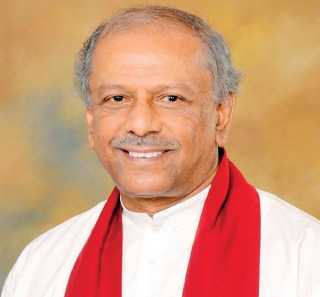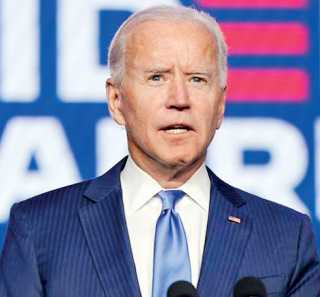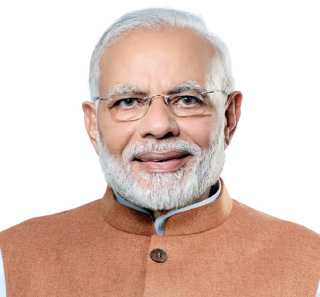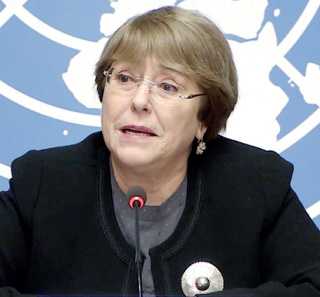Tuesday Feb 17, 2026
Tuesday Feb 17, 2026
Thursday, 18 March 2021 00:30 - - {{hitsCtrl.values.hits}}

President Gotabaya Rajapaksa

Foreign Minister Dinesh Gunawardena

US President Joe Biden

Indian PM Narendra Modi

Malawi President Lazarus Mccarthy Chakwera

UN High Commissioner Michelle Bachelet
 The final version of the proposed resolution to promote “reconciliation, accountability and human rights” in Sri Lanka was tabled on 12 March at the 46th session of the United Nations Human Rights Council (UNHRC) in Geneva. It was sponsored by the United Kingdom (UK) and co-sponsored by Germany, Canada, Malawi, Montenegro and North Macedonia.
The final version of the proposed resolution to promote “reconciliation, accountability and human rights” in Sri Lanka was tabled on 12 March at the 46th session of the United Nations Human Rights Council (UNHRC) in Geneva. It was sponsored by the United Kingdom (UK) and co-sponsored by Germany, Canada, Malawi, Montenegro and North Macedonia.
A preliminary draft was tabled on 22 February at the commencement of the current session by the UK along with the other five countries known collectively as the “core group” on Sri Lanka. The resolution on Sri Lanka would be taken up for voting on 22 or 23 March by the 47 member states of the UNHRC. Sri Lanka is firmly opposed to the resolution and has called upon UNHRC member states to vote against and defeat the resolution.
UK stance
Lord Tariq Ahmad, the UK Minister of State for South Asia and the Commonwealth, summed up the position and approach of the UK in tabling the resolution, in his response to a group of Tamil organisations in Britain which were clamouring for a stronger text in the resolution.
Ahmad stated as follows: “We believe the resolution the UK has presented to the UNHRC is an ambitious one that can pass in the face of challenging UNHRC dynamics. Voting members of the Council change every year, and current voting members are not the same as those who voted on previous resolutions.
“The 2021 composition is particularly challenging for consideration of country resolutions. The risk of losing a vote is very serious and tabling an unwinnable resolution would likely result in the end of any accountability process and would be a crushing blow to the victims and all those who have fought for justice and accountability. A failed resolution would also see Sri Lanka removed from the agenda of the UNHRC, making it more difficult to draw international attention to the human rights concerns identified in the recent report by OHCHR. While we will continue to consider amendments to our resolution during the course of negotiations, we strongly believe that it is the best way of achieving accountability and justice for all those affected by the conflict.”
Lobbying for support
In my ‘Political Pulse’ column last week titled ‘UNHRC, Gota Govt. and the great game in Geneva,’ I wrote as follows: “According to informed diplomatic sources, a prima facie survey of the battle-lines drawn revealed that the core group was sure of only 17 out of 47 member state support for the resolution currently. The anti-resolution camp was sure of 13 at present. Based on these estimates it appears that the votes of 17 countries are up for grabs.”
As stated above the past weeks did see much activity in the form of lobbying among countries of the UNHRC for and against the resolution on Sri Lanka. Apart from four rounds of informal discussions being conducted openly, there were many other – behind the scenes – bilateral, trilateral and multi-lateral talks among UNHRC member states on the text of the resolution pertaining to Sri Lanka. The original version underwent three major amendments and several minor changes in the process. The final version of the four-page resolution tabled at the UNHRC exceeds 1,700 words.
In an unexpected turn of events, the wording in the resolution was further strengthened in the final version. This was most unexpected as the usual practice in matters like these is for the sponsors to soften or dilute the text of the resolution to gain broad acceptance in order to win as much support as possible.
However in this case the sponsors of the resolution have not made any adjustments or compromises. Instead the text has only been tightened and toughened. This unprecedented move is attributed to the high degree of confidence among the co-sponsors and their backers that the resolution would be passed. It is also a strong signal sent to Sri Lanka and her backers that the resolution proponents mean business and are likely to adopt a hardline approach towards Sri Lanka in the future.
According to the assessment of a well-informed Western diplomat, the current position was one where the proponents of the resolution were confident of getting 20 supportive votes at least. The opponents of the resolution were sure of 10 votes; 11 countries are non-committal and most likely to abstain; five countries are seemingly undecided.
Under these circumstances the sponsors are optimistic that the resolution would be passed unless something totally unexpected happens. Nevertheless the core group is intensely canvassing to make some more countries to vote for the resolution thereby getting it passed with at least 24 of the 47 member states voting for it. It is opined that an absolute majority as opposed to a simple majority would provide greater credibility to the resolution.
The UNHRC
The United Nations Human Rights Council comprises 47 member states elected by the UN General Assembly. They are elected from time to time for specific terms. Extra care is taken to ensure that the membership equitably represents the geographical regions of the world. There are five groupings namely African States, Latin American and Caribbean States, Asia-Pacific States, Western Europe and Other States and Eastern European States.
A. There are 13 African Member States, namely Burkina Faso, Cameroon, Ivory Coast, Gabon, Libya, Malawi, Mauritania, Namibia, Senegal, Somalia, Sudan and Togo.
B. The eight Latin American and Caribbean Member States are Argentina, Bahamas, Bolivia, Brazil, Cuba, Mexico, Uruguay and Venezuela.
C. The Asia-Pacific Region has 13 member states. They are Bahrain, Bangladesh, China, Fiji, India, Indonesia, Japan, Marshall Islands, Nepal, Pakistan, Philippines, Republic of Korea and Uzbekistan.
D. The Western Europe and Other States Category has seven member states. They are Austria, Denmark, France, Germany, Italy, Netherlands and the United Kingdom (UK).
E. There are six Member States in the Eastern European States category. They are Armenia, Bulgaria, Czechia, Poland , Russian Federation and Ukraine.
According to the official UNHRC website: “The Human Rights Council is an inter-governmental body within the United Nations system responsible for strengthening the promotion and protection of human rights around the globe and for addressing situations of human rights violations and make recommendations on them.”
As such the UNHRC does have the right to engage in “benign intervention” if and when a state is perceived as violating the human rights of a substantial segment of its population. The duty to do so becomes imperative when those alleged offences amount to grave violations of International humanitarian law such as crimes against humanity or war crimes. In such situations sovereign nations can protest over “interference in internal affairs” but neither the UN Human Rights Chief nor the UN Human Rights Council can be expected to remain aloof.
Sri Lanka’s misplaced confidence
It was at the 43rd session of the UNHRC in February 2020 that Foreign Relations Minister Dinesh Gunawardena announced Sri Lanka’s decision to “withdraw from the co-sponsorship of Resolution 40/1 on ‘Promoting reconciliation, accountability and human rights’ in Sri Lanka”.
At that time top foreign military officials were cock-a-hoop reflecting the bravado and braggadocio of the Gotabaya Govt. When asked whether this announcement of a withdrawal amounting to grandstanding would not pave the way for a future resolution that could be adverse to Sri Lanka, the Foreign Ministry officials were dismissive.
This buoyancy in Foreign Ministry circles last year was due to two factors. One was that Colombo expected Donald Trump to be re-elected as President and that the US would not return to the UNHRC. The second factor was an over-estimation and over-reliance on China. Colombo expected Beijing to be its defender, protector and triumphant victor at the anticipated battle of Geneva.
Sri Lanka had been overconfident in unilaterally announcing a “withdrawal” instead of opting to re-negotiate a resolution. By doing so, Sri Lanka had flung the gauntlet down at the UN High Commissioner for Human Rights, the UN Human Rights Council and the key Western States responsible for mooting such a resolution on Sri Lanka. This warranted an effective response. So when the 45th session of the UNHRC concluded in September last year, the question of a resolution on Sri Lanka loomed large on the Geneva horizon.
After Donald Trump had pulled the USA out of the UNHRC, the mantle of leadership on handling Sri Lanka had been donned by the UK with the support of Germany and Canada. Initially the UK, Canada, Germany, Montenegro and North Macedonia were the five countries comprising the core group on Sri Lanka after the US exit (Malawi was included this year).
Feasibility of fresh resolution on Sri Lanka
With the UNHRC’s 46th session being scheduled to begin in March 2021, the Core Group of Countries were somewhat uncertain whether a fresh resolution on Sri Lanka was feasible at the UNHRC in Geneva. There were three main reasons for this.
Firstly, there was the absence of the US in the UNHRC. In the past, the USA had been primarily responsible for getting resolutions on Sri Lanka being passed at the UNHRC. Efforts to pass resolutions on Sri Lanka prior to 2012 had failed because the USA was not involved. Since Trump had taken the US out of the UNHRC, Washington was now out of the equation.
Secondly, China had enhanced its influence and power within the UNHRC after the exit of the USA. This increased stature reflected in a sense the expanding role of Beijing on the global stage. It was surmised that eight to 13 countries among the 46 UNHRC member states could be influenced by China. Therefore it was expected that China would support Sri Lanka strongly and lobby for the island nation at a vote in the council. This was due to the perception that the Gotabaya Government had firmly hitched the Sri Lankan wagon to the star of China.
Thirdly, the vote on a resolution relating to Sri Lanka could in the final analysis turn out to be a clash between the Global South and North. The less-developed countries from the African, Asia-Pacific, Latin America and Caribbean regions outnumbered the comparatively well-developed European and other nations in the UNHRC. By exploiting the ingrained resentment among the “have nots” against the dominating tendency of the “haves,” Sri Lanka could mobilise support against the resolution. Besides Lanka’s traditional allies like Russia, Cuba and Pakistan would muster support too.
Under these circumstances there was marked reluctance – after September 2020 – on the part of the core countries to proceed with moves to bring forth a new resolution on Sri Lanka in March 2021. Efforts were taken first to explore possibilities of getting Sri Lanka’s consent for continuing with a modified “roll over” resolution. Sri Lanka ruled this out firmly.
The next option pursued was a consensual resolution with Sri Lanka’s concurrence. Preliminary moves in this direction met with little success as Sri Lanka was nonchalantly non-receptive. A top Sri Lankan Foreign Ministry official stated that a consensual resolution though desirable from one perspective would be politically challenging to the Government in power.
It became crystal clear that Sri Lanka would not opt for a consensual resolution while not rejecting the proposal outright. Thus the core group had to take steps to draft a new resolution on Sri Lanka and ensure its passage at the UNHRC.
There was some disagreement within the core group at this juncture. Germany was of the view that a resolution on Sri Lanka could not be successfully passed. The UK and Canada disagreed and decided to take the plunge. They suggested that a resolution be tentatively drafted and Sri Lanka’s consent for a consensual resolution be sought. Germany then fell in line and moves to draft a fresh resolution got underway.
Enter the US
The proponents of a resolution on Sri Lanka received a tremendous boost when Joe Biden was elected in November 2020 as the 46th President of the United States of America. It soon became obvious that President Biden would rectify the damage done by Donald Trump and restore US foreign policy to its former glory.
The USA would return to the UN Human Rights Council and Washington would once again stand up for democracy and human rights around the world. It would also seek re-election to the UNHRC for the 2022 to 2024 term. Hence the core group now needed to push through a “holding” resolution that would retain the UNHRC grip on Sri Lanka until the US was back in the game effectively.
Bachelet report
Even as efforts to formulate a draft resolution on Sri Lanka were on, the United Nations High Commissioner for Human Rights Michelle Bachelet released her report to the public on 9 February, a fortnight before the UNHRC sessions began. It was titled ‘Promoting reconciliation, accountability and human rights in Sri Lanka – Report of the United Nations High Commissioner for Human Rights’.
The hard-hitting report severely reprimanded the Sri Lankan Government and urged member states of the council to adopt stringent measures. The UN Human Rights Chief’s report was a source of inspiration to the resolution drafters. It also indirectly laid down the parameters for the resolution.
Another related development that aided the co-sponsors immensely was the return of the US to the UNHRC and its overt backing of the resolution on Sri Lanka. US Secretary of State Antony Blinken in a virtual address to the UNHRC referred to Sri Lanka by name and openly called for support to the resolution against the Rajapaksa regime.
Bolstered by all this, the core group of countries engaged in some tactical manoeuvres to help draw in wider support for the resolution. The African country Malawi was co-opted as a co-sponsor. By this act, a non-Western country representing the Global South was added to the resolution proponents.
More importantly, Malawi’s President Lazarus Mccarthy Chakwera is a Christian theologian who was the head of Malawi’s Assemblies of God Church for 25 years. Malawi itself is a Christian majority (77%) country. Through President Chakwera’s influence, the co-sponsors hoped to get the support of Malawi and other African countries with a Christian majority such as Togo (43%), Namibia (87%), Gabon (82%), Eritrea (63%) and Cameroon (70%).
Wooing Islam majority countries
Eleven of the 47 or roughly one-fourth of UNHRC member states have an Islamic majority. Seeking to exploit this the core groups altered the draft resolution wording to include the “mandatory cremation” of Muslim COVID victims issue. The objective was to woo Islam majority countries into voting for the resolution or wean them into refraining from opposing it.
This stratagem seemed to have succeeded when the Organization of Islamic Cooperation (OIC) with 58 members issued a strong statement against Sri Lanka. Sri Lanka lifted the ban on burials. The co-sponsors refused to amend the text regarding mandatory cremations despite urging by Sri Lanka.
Another strategic bloc of countries is the group of Latin American and Caribbean countries known as GRULAC. There are eight Latin American and Caribbean Member States in the UNHRC namely Argentina, Bahamas, Bolivia, Brazil, Cuba, Mexico, Uruguay and Venezuela. It is hoped that the personal prestige and international standing of the highly-respected Human Rights Chief Michelle Bachelet would help attract support for the resolution from the GRULAC.
Bachelet was President of Chile for two terms and helped the country progress in the spheres of de-militarisation and re-democratisation. According to a knowledgeable human rights activist, five of the GRULAC countries are expected to vote for the resolution. Cuba and Venezuela would vote against while Bolivia remains a question mark.
Indian enigma
Another enigma is India. It appears that India would most probably abstain from voting but will New Delhi emit “signals” to other member states that may influence their voting? The co-sponsors have included clauses emphasising Devolution through the 13th Amendment with special mention of the Northern and Eastern Provincial Councils. Will this be appreciated by India?
Meanwhile President Gotabaya Rajapaksa has had a one-to-one conversation with Prime Minister Narendra Modi. Foreign Secretary Jayanath Colombage has made repeated appeals to “Mother” India through interviews with Indian media. All that Colombo has got so far is an assurance that India would not do any “injustice” to Sri Lanka.
So what New Delhi would do or not do remains an “unknown” still. The co-sponsors however are cautiously optimistic that the resolution on Sri Lanka would pass with or without Indian support. Moreover the co-sponsors and their backers are confident enough to aim at 24 plus votes in the 47 member council.
Sri Lankan stance
Notwithstanding the optimism of the co-sponsors, it remains to be seen as to how the resolution would actually fare at the time of voting. The Sri Lankan Government headed by President Gotabaya Rajapaksa has not thrown in the towel yet and fights on gamely to bring about the defeat of the resolution. Informed Foreign Relations Ministry sources however are pessimistic about the outcome being favourable to Sri Lanka.
According to media reports, a book titled ‘Geneva Crisis – The Way Forward’ compiled by the Ambassadors’ Forum of Sri Lanka was launched at the Foreign Ministry. Foreign Relations Minister Dinesh Gunawardena and Foreign Secretary Jayanath Colombage participated at this launch.
Commenting on the UNHRC resolution, Gunawardena was optimistic that member countries of the UNHRC would be supportive of Sri Lanka. Speaking at the same event, Colombage said that Sri Lanka would fight hard at the UNHRC but was unsure about winning the vote in Geneva.
Against this backdrop, the multi-crore question is whether Sri Lanka is fighting a lost battle at the UNHRC in Geneva.
(D.B.S. Jeyaraj can be reached at [email protected])